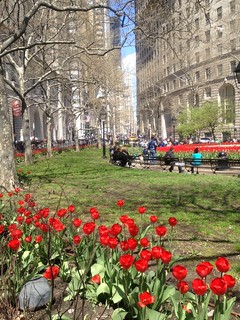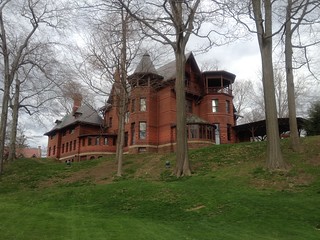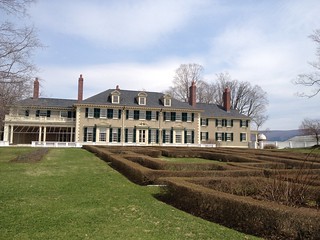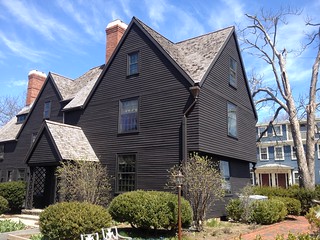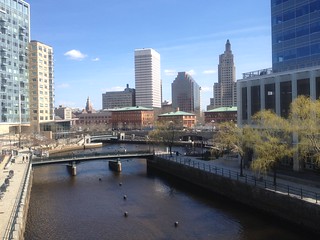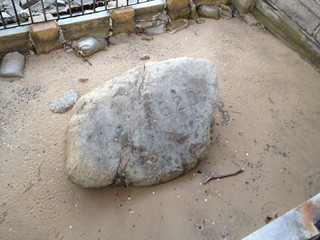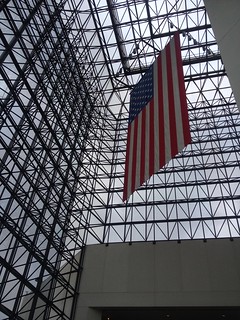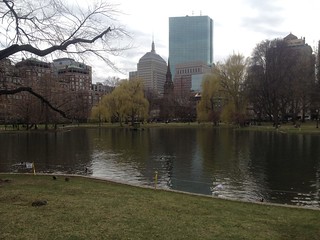Arrived in the 6th state of my rapid trip around New England and the final stop in grand old New York, looking scrumptious in the spring sunshine. Decided not to drive into the city, so dumped my car in Stamford and caught the Metro North West, just 60 minutes into Grand Central Station and the heart of Manhattan.
The cherry blossom is out all over the city, turning the sidewalks into grand corridors carpeted with flowers, as well as the usual garbage and roadworks festooning the town.
Tried out the new city bikes scheme, the same as London's Boris bike idea. It's great as it makes short journeys across town so much easier, if you can avoid the traffic which races through the streets. And the tourists aimlessly ambling over the road. And the pot holes. And the cycle rickshaws.
Took in a couple of of shows by getting tickets from the half price box office. Even half price they are more expensive than London. I'm sure they used to be comparable. Saw Pippin and Bullets over Broadway, both very different but very entertaining.
Took a trip down to Ground Zero. Last time I entered that space in 1995 I traveled to the 120th floor for a stunning view down the whole island. Nowhere are two massive pits where the towers stood, marked by a suturing water feature pouring into a black void. The names of all who last their lives in the terrible events of 9/11 are inscribed around the base of the towers.
Home tomorrow after a trip around Liberty Island.
Now in Hertford, capital of Connecticut, and home to two icons of American literature. They were neighbours in the Nook Farm area of the city, at the end of the 19th Century, and both of their houses been lovingly preserved as a monument to their work.
The first is Harriet Beecher Stowe whose book Uncle Tom's Cabin, focused American citizens on the horrors of slavery, by depicting families ripped apart, as children were sold from their mothers. It was the best selling novel of the 19th century and Abraham Lincoln reportedly credited Beecher Stowe with starting events that led to the Civil War and ultimately to the end of slavery.
A neighbour was a generation younger, and when he moved to Connecticut he had not yet attained the worldwide fame he would later enjoy. Samuel Clements, known to the world as Mark Twain, would you write most of his most acclaimed works in the house in Hartford including the adventures of Tom Sawyer and Huckleberry Finn. His house is a marvellous Gothic monstrosity where he lived for over 20 years, until bad investments forced him to seek a cheaper life in Europe.
Took in the northern part of New England with a trip through New Hampshire and Vermont. Much more rural up here, with long distances between small towns. Concord is the capital of New Hampshire with an antique statehouse claiming to be the oldest in continuous use in United States.
Vermont is the state of the covered bridges, apparently they last much longer if protected from the effects of the rain and the snow and freezing weather.
I came to Vermont to visit Hilldean, the estate which belonged to Robert Todd Lincoln, son of the esteemed president. The house stands on top of a cliff overlooking the valley with views across to the green mountains beyond. It's an amazingly good competition complete with automatic organ to fill the house with music.
Robert Lincoln was Chairman of the Pullman company and the grounds contain restored Pullman coach, rescued from South Carolina and now restored and housed on the estate. An amazing throwback to the days when crossing the continent meant a three day train journey.
One of the questions in the visitor centre is how many witches were hanged in Salem? The answer is of course none, but 20 innocent people lost their lives in the hysteria which broke out in this small settlement in 1692.
Nearly 200 were accused in the wave of paranoia which swept through the community, when several young girl started having fits and blaming apparitions on witchcraft. Those who tried to help or dismissed the hysteria for the mumbo-jumbo it was, were accused themselves, some going to the gallows.
In all 19 would hang, while one 80 year old was crushed by rocks as a form of torture to try to get him to make a plea. Since then the courts have all reversed the verdicts with the last pardons coming as late as 2001.
The town now lives on its reputation for being the Witch capital of the United States, with museums and experiences dotted all over the town. There are an awful lot of tarot card readers and psychics advertising in shop windows. Thankfully the only damage the modern day psychics do is to separate fools from their money, rather than the innocent from their lives.
Moved into the smallest state in the union, although not the one with the lowest population. At just 37 miles across and 49 miles high it certainly is compact.
One mystery solved is why it's called an island when most of it is most firmly attached to the mainland. The answer comes when you look at the full title which is 'The State of Rhode Island and Providence Plantations'. Small state, big name.
13 percent is water which leads to some wonderful views. Browns University tops the hills of Providence, looking idyllic in the spring sunshine. It was all built on the profits from the slave trade, as were the grand houses surrounding it. Mind you I can't cast stones having gone to university in Bristol.
Popped down to Newport, incurring a 10c toll on the bridge. Not much maybe but the hassle caused by trying to pay it is great.
Bitterly cold which is a bit of a shock after the lovely weather at the weekend. Spent the day exploring Cape Cod in all its stark beauty.
Began at Provincetown which was the point the Pilgrims first landed in the new world. They spent a month up there, doing a bit of washing, stealing some corn from the natives and desecrating some graves, before moving on. A tower now stands on the hill with panoramic views over the whole cape.
The pilgrims were a bit off course, having intended to settle in North Virginia, but winter was drawing in and they were pretty exhausted from the trip, so decided it would have to be New England.
Plymouth was their final destination, stepping onto the new continent via the Plymouth Rock. It's still there, under a stone portico now, and split in half thanks to a misguided attempt to move it inland during the 18th century.
It must have been bleak that first winter. The wind whistled over the dunes today, and it's the middle of April. Camping out through the harsh winter storms in soaking wet woollen garments must have been hell. No wonder half if the original 104 were dead within a year. Some are buried in the old cemetery on top of the hill.
Also visited Hyannis, once the headquarters of the Kennedy dynasty. Now a beautiful little town on the edge of the ocean.
After the bright sunshine at the weekend, today it was teaming with rain so I headed down to the
Kennedy presidential library on Columbia Point just south of the city.
It's a fascinating place, filled with memorabilia from the 35th president, including recreations of that infamous TV debate and a mock up of the Oval Office. But perhaps the most chilling exhibit is the one on the Cuban missile crisis. I don't think many know just how close we came to world War three at that time, but the exhibits here hammer that reality home. Kennedy secretly recorded his Cabinet meetings at the time. Who knew, I thought Nixon started that caper. Some of the recordings are played in the exhibition, it's clear neither the president or his cabinet knew just where the consequences of their actions would take them.
The Massachusetts archives over the road houses number of historical documents including the original Royal Charter for the settlement of Massachusetts Bay and a copy of the declaration of Independence. The Bill of Rights is also here, even though Massachusetts didn't get around to ratifying it until 1939. Better late than never
Back in the United States again, this time in New England following the Trail of the pilgrim fathers. Arrived in the capital of the Commonwealth of Massachusetts, Boston on a beautiful spring day. I can see why they decided to stay.
Staying in a hotel next to Boston Common, founded in 1634 as it proudly proclaims at the entrance. For America that's practically prehistoric. It was packed with families out enjoying the Sunday sun. The hill is capped with the magnificent State Capital, with its golden dome glinting under the spring sunshine.
There was a tea party meeting at the bandstand, but it didn't seem that well supported. Not surprising in an overwhelmingly democratic state. the speaker seemed very worried about his taxes. The original tea party took place just a few blocks from here when some patriots, dressed as red Indians, dumped a shipment of tea into the harbour, thus making it undrinkable, even for Americans. (NB: Not my joke, it comes from Mary Poppins)
Spent the day following the Freedom Trail which takes your past many buildings associated with the American war of independence. Benjamin Franklin, John Adams, Paul Revere and John Hancock are all names associated with the area and all played important parts in the struggle against the crown. Some if them are buried in the old graveyards preserved throughout the city.
The trail finishes at bunker hill, one of the early battles in the war took place here, with many casualties. The hill is now topped with a monument, just like the one in Washington.
